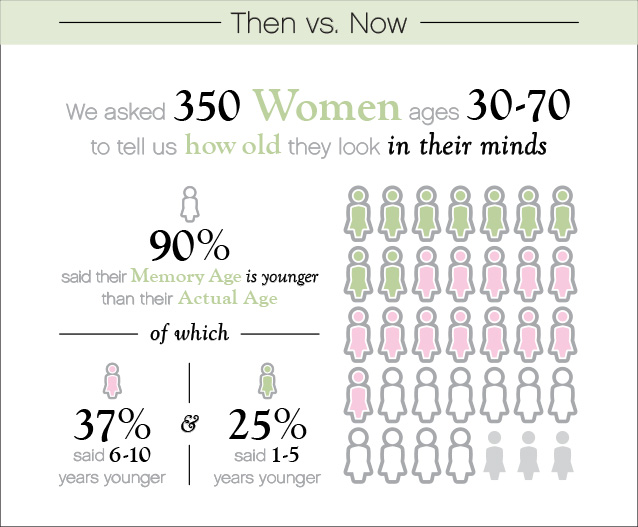Camas, WA
Injectables
Skin Rejuvenation
Hair Restoration & Growth
Shop By Category
Close your eyes. Really, close them.
Now, picture yourself. How old do you look in your mind?
That right there, my Lovelies, is what we are calling your “Memory Age”.
Now, compare her to how old are you really? Did you find much of a difference? If you did, you’re not alone. We recently asked 350 women aged 30-70 across the U.S. to tell us how they mentally “see” themselves. Each participant was asked to close their eyes and conjure up a mental picture of themselves and tell us how old they look. It turns out, we’re all carrying around a “memory photo” of ourselves and she is on average 10 years younger than we are today. Proof that women (whether 35 or 65) are not trying to recapture their youth – they just want to turn the clock back a bit.
Let’s be clear, I spend a lot of time thinking about aging. For one, I am nationally certified in Gerontology, which is the study of aging and its effects. For years I studied the human struggle with the natural signs of aging and what they could do to slow the hands of time. Our tools back then were restricted to lifestyle changes proven to increase longevity – healthy eating, exercise and sunscreen, but that did little for our faces. Around this time aesthetic medicine was really taking off, offering an arsenal of new tools that could help my patients feel more confident in a way that stayed true to their self-image. I was in.
 What I soon learned is that “self-image” is a loaded word and not so easy for someone to explain. My inner curiosity about the study of aging came flooding back, and I was again listening for what it was they really wanted. What were they really trying to achieve? Were their expectations reasonable or did they all just want to look 21 again? Turns out, the truth is in our memories.
What I soon learned is that “self-image” is a loaded word and not so easy for someone to explain. My inner curiosity about the study of aging came flooding back, and I was again listening for what it was they really wanted. What were they really trying to achieve? Were their expectations reasonable or did they all just want to look 21 again? Turns out, the truth is in our memories.
And while the main characteristics of one’s younger self are what we expected – younger, fewer wrinkles, better skin, more rested – our survey was not without its surprises. When asked to reflect on their Memory Age, almost 40% were surprised by how much younger their Memory Age is. Surprised? Don’t we all look in the mirror every day? More proof, I suppose, that our minds may be playing tricks on us when it comes to aging.
But most telling to me was that the women we surveyed told us that their Memory Age was linked to an important period in their lives, though not necessarily what you might expect. Sure, some of the respondents associated it with important personal milestones like falling in love or getting married, but the overwhelming majority – 40 percent – associated their Memory Age with feeling successful in their career. At first, I was puzzled, but then it hit me: for everyone, people’s Memory Age is linked to the time in their life that they felt most confident.
I encourage you to check out the rest of the findings from our Memory Age survey. And worry not, Lovelies. If you think your Memory Age is gone for good, think again. Since I made my own career move into medical aesthetics, the tools have improved in leaps and bounds. Recent injectable product launches tout their ability to take years off a person’s appearance! So, it’s possible for nearly everyone to look their Memory Age again without expensive surgery.
# # #